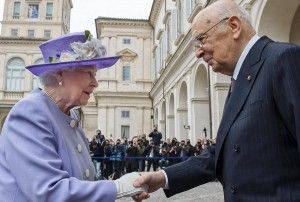Britain's ambassador to Italy reflects on the strong relationship between Italy and the UK and the vital role of Wanted in Rome for the capital's expats and Italians.
Italy has always been important to the UK. This is no empty rhetoric but goes back to the very beginning of the ‘Italian story’. Our very first diplomatic mission in the world was to Florence in the mid-16th century (when the great Queen Elizabeth I needed a loan from the world’s first bankers). Later, there was a long tradition of young British aristocrats making Italy the centre of their European “Grand Tour”. No gentleman’s education at the time could be considered complete without having spent months in Italy. They would have benefitted from Wanted in Rome.
Italy’s advance to full statehood also took place under a benevolent British eye and with some British help. The British public were hugely sympathetic to the Italian Risorgimento. The adventures of Garibaldi in the south of Italy might never have got off the ground if it had not been for the presence of the Royal Navy, even if interpretations vary over the exact nature of the British activity in the area. While some historians may debate the finer points, Garibaldi himself recognised his debt to the British.
I have a fine silk flag in my office in Rome which Garibaldi gave to a British officer, one Captain Peard, for his services at the Battle of Milazzo. The four words on the flag are in English: Italy, Victor Emanuel and Garibaldi.
Things have changed a lot since then, but British fascination with Italy’s history, art and culture continues to the present day, with many thousands of British holidaymakers coming to visit museums and archaeological sites throughout Italy; and just to enjoy all the good things Italy offers. Of equal significance now, also, are our large common commercial and technological interests. In 2015, these will shortly focus on the Expo in Milan. Italy and the UK share a common tradition as trading nations. International commerce is essential to the prosperity of both our countries, even more so in the wake of the economic crisis from which Europe has far from emerged.
The Milan Expo represents a great chance to give a stimulus to our economies. Our commercial interests with Italy do not start or stop with the Expo, however. The most significant potential engine for growth in Europe is the Single Market, one of the EU’s great successes but one now needing to be upgraded to reflect the 21st-century global economy. Italy and the UK have a strong shared interest in completing a strong single market in services, digital and energy. We should also free business to create growth and jobs by reducing the burden of unnecessary regulation, an issue which is of particular concern to Italian SMEs. Looking outwards, success in the negotiation of a transatlantic free trade area is another important part of our common agenda with Italy.

We can look back to the founding of Wanted in Rome and the world of 30 years ago. The Cold War still hung over Europe. There was the Falklands war. We had Margaret Thatcher’s Britain, while Italy was approaching the final years of the First Republic. Together, we were in the run-up to Maastricht and with the entry of Greece we had 10 EU member states. Poland was continually in the news and Solidarity was a household name. A completely different era but the positives in our relations have remained constant.
In the course of these 30 years, Wanted in Rome has made our life easier by helping us reach out to British nationals, many of them resident here in Italy for many years, with important messages, which we would otherwise have found difficult to communicate widely. This remains an important role, despite the new powerful social media. Not everyone is online and it is important that Wanted in Rome continues to print a paper version, user friendly, for those who do not subscribe to the idea of the ‘connected community.’
One former Vice Consul admitted that she would not have known about an important event the embassy was involved in recently, if it had not been for Wanted in Rome. This is not in any way to downplay the importance of Wanted in Rome’s presence on the web and their use of social media. One recent measure of this has been the response to an advertisement for a temporary job vacancy which we posted online through Wanted in Rome. We received three times the number of applications that we normally get.
But Wanted in Rome is not all about expat Brits: it is read by many other nationalities as a kind of Time Out for Rome since, unlike many other local publications, Wanted in Rome is constantly being updated. So your readers can trust what they read about cultural events, films, shows etc. As a consequence Wanted in Rome is also read by many Italians.
So, on behalf of the embassy I would like to express our sincere thanks for the cooperation which we have enjoyed over these years and to wish you every success for the next 30.
Christopher Prentice
SIDE NOTES
The UK pavilion – where business, science and culture combine
The UK pavilion at Expo 2015 is inspired by the journey of the honey bee to highlight the role of pollination in the food chain.
Visitors will walk through a fruit orchard and enter a natural wildflower meadow. As they near the middle of the meadow, from a restful amphitheatre the centre of the structure will come into view: a golden orb made of fine steel lattice based on the design of a honeycomb. The “hive” will pulsate and buzz with the noise of a real bee colony.
There are three focal points to the pavilion: first the orchard, where visitors will be welcomed by British apple and pear trees. Then a staircase leads to the meadow, which is a gently undulating green roof to the service areas of the pavilion (shops, gallery, office, plant room, bar and kitchen).
From the meadow there are multiple pathways that reflect the orienting dance of the honey bee. These eventually lead to the hive, a sphere that could represent an atom, the planet, the sun or a grain of pollen. Its structural design is the most inventive part of the pavilion, using a variety of new and sophisticated materials and geometrical shapes that mirror the inside of a hive. It is connected to a real hive via accelerometers that measure the bees’ vibrations and LED lights to reflect their movements as they work. There is also a live video feed from the hive to be screened on a wall in the orchard.
Wolfgang Buttress, the designer of the British pavilion, explaining the inspiration behind his winning project, says that there is an intrinsic relationship between bees and humans. Not only do bees pollinate every third mouthful of food we consume, but the organisation of the hive and the complex interdependencies of the social structures within it are an advanced and complex ecosystem, with parallels in human culture. The hive acts as a sort of barometer of the world’s health, and the present precarious state of the health of bees in the developed world, threatened by the neonic pesticides which caused irreparable harm to swarms across the continent last Spring, is a serious omen for the planet. Colony collapse disorder (CCD) is a major threat to bee colonies – and crop pollination – around the world, whose origins are still not fully understood.
The €6 million contract for construction of the pavilion was awarded to two British companies, construction consultants Stage One, which is based in York, and the London-based RISE, that specialises in temporary structures. Wolfgang Buttress has a small studio in Nottingham and last year won the Kajima Gold Award in Japan for his exhibition Space. The British minister of trade said the pavilion “will promote the UK's world-leading expertise in the creative, life sciences, agri-tech, food and drink sectors to our top trade and investment partners.”
Grown in Britain – promoting UK leadership and innovation internationally
A ‘Grown in Britain’ international events campaign and global business programme will use the platform of Expo 2015 to demonstrate UK capabilities across the world and show leadership in international development.
The campaign offers opportunities for the UK to engage in Milan with global leaders and thinkers around issues of nutrition, food security and international development. It will allow UK businesses and organisations to demonstrate their products and innovations globally in these vital sectors.



















